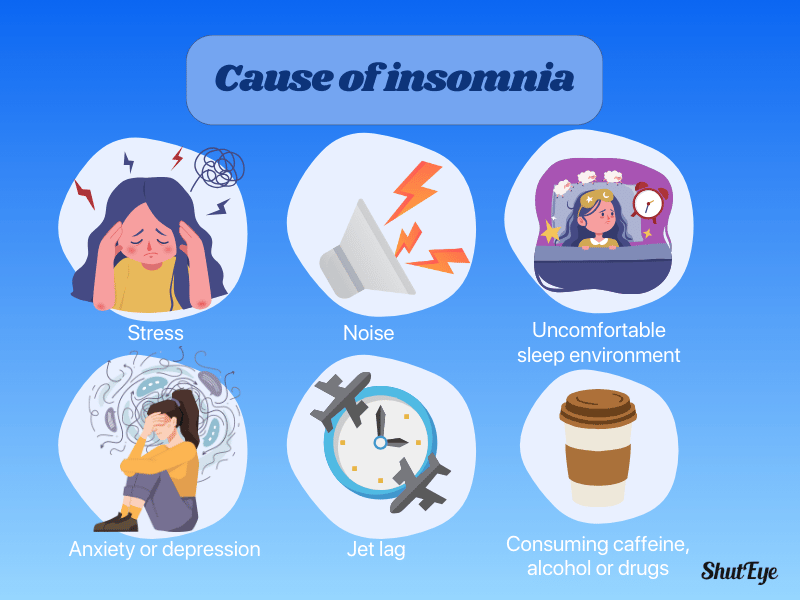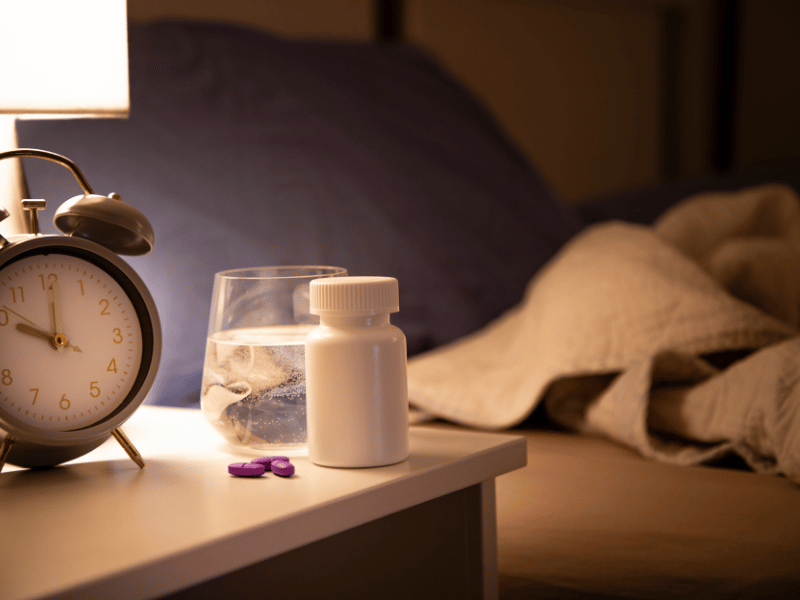


Insomnia is one of the most common sleep disorders that affects up to one-third of adults at any given point in time. It’s the inability to fall asleep or stay asleep no matter how long you’ve laid in bed and there are some reasons to explain why that happens.
In this article, we’ll look at the common insomnia causes, symptoms, and how to better cope with this condition.

Insomnia can be defined as having trouble falling asleep, trouble staying asleep, or both [1]. It is a common sleep disorder that affects many adults and can be categorized into two forms— acute insomnia and chronic insomnia.
Acute insomnia (short-term insomnia) refers to insomnia episodes that may last for up to a few days while chronic insomnia refers to ongoing sleep problems that last for 3 months or longer. It’s also usually diagnosed by a doctor.

Many different factors can cause insomnia, including lifestyle factors or mental health conditions.
Some of the most common causes include:

While insomnia affects just about anyone, a study has found that there’s a higher likelihood (up to 58%) of females experiencing insomnia compared to males [2]. Multiple factors contribute to this data.
The most distinct factor is hormones. Females have two major hormones, progesterone, and estrogen that are responsible for regulating the biological functions of the body. Throughout a female’s life, it goes up and down continuously, affecting sleep [3].
Additionally, pregnancy and postpartum can also lead to poor sleep quality. Sleep difficulties are found to be common during pregnancy, affecting almost 80% of pregnant women during the third trimester of pregnancy [4]. In the later stages of a woman’s life, she may develop menopause, changing sleep patterns and affecting sleep quality as a result.

Not everyone will be at risk for insomnia but certain groups of people may find themselves at an increased risk for developing insomnia symptoms in comparison to those who don’t.
Common risk factors include [5]:
Insomnia symptoms can vary from person to person but the most common symptoms that have been reported by people with insomnia include the following [6]:
If you are experiencing insomnia symptoms that are affecting your overall quality of life, you may want to consider consulting a sleep specialist. Your sleep specialist will collect your past sleep history and may propose doing a sleep study to properly diagnose insomnia.
Insomnia symptoms can get better if you choose to practice good sleep habits. Here are five effective ways to help you cope with insomnia and improve the quality of your sleep.
There are many ways to cultivate good sleep hygiene practices or habits so that you can enjoy a restful sleep. These practices include establishing a consistent sleep schedule, creating a sleep-friendly environment by ensuring it’s dark, cool, and quiet, limiting screen time before bed, and avoiding too many daytime naps.
Small habits like not sleeping right after a meal or avoiding caffeine close to bedtime can also help to make a difference.

Sometimes, insomnia can be caused by too much stress, worry, or anxiety. Incorporating guided meditation exercises or deep breathing exercises can help you bring awareness to the present moment and release all of the tension you’re carrying.
When you are in a relaxed and calm state, it is much easier for you to fall asleep and stay asleep at night.
This may come as a surprise but staying in bed if you’re already struggling to fall asleep is not going to do you any good!
Trying to force yourself to go to bed will only create more stress, exacerbating the problem further. If you can’t seem to fall asleep within 20 minutes or so, it’s a good sign to get out of bed. Try going to a different room or doing a relaxing activity until you start to feel tired.

If trying several home remedies does not seem to help, you can consider the use of sleeping pills or supplements like melatonin. In the short term, using it may help but you are still advised to seek advice from a healthcare professional before consuming anything.
It’s also recommended to avoid using them as a long-term solution to prevent dependency.
You can also consider seeking professional help from a certified sleep specialist if you’ve exhausted all self-care strategies. Identifying the root cause of your insomnia and taking steps to address it can help you work on and reduce these symptoms.
Also, there are treatment options such as cognitive behavioral therapy for insomnia (CBT-I) which your doctor may recommend based on severity.

In conclusion, anyone can experience insomnia and find it hard to sleep or stay asleep at any point in their lives. It could be due to stress, anxiety, poor sleep habits, or other lifestyle factors. Practicing good sleep hygiene and incorporating other self-care strategies can help you to better cope with these symptoms so that you may hopefully get better rest.
If you experience difficulty falling asleep at night, you may want to consider using the ShutEye® app as part of a self-care strategy. ShutEye® is an advanced sleep-tracking app that tracks your sleep cycles, offering personalized recommendations to help you improve your sleep quality. Try it for FREE today!
Chen, J. (2017) Women, Are Your Hormones Keeping You Up at Night? [online]. Available at: https://www.yalemedicine.org/news/women-are-your-hormones-keeping-you-up-at-night
John Hopkins Medicine (2025) Insomnia [online]. Available at: https://www.hopkinsmedicine.org/health/conditions-and-diseases/insomnia
Penn Medicine (2022) Insomnia [online]. Available at: https://www.pennmedicine.org/for-patients-and-visitors/patient-information/conditions-treated-a-to-z/insomnia
Smyka, M., Kosińska-Kaczyńska, K., Sochacki-Wójcicka, N., Zgliczyńska, M., & Wielgoś, M. (2020). Sleep Problems in Pregnancy—A Cross-Sectional Study in over 7000 Pregnant Women in Poland. International Journal of Environmental Research and Public Health, 17(15), 5306. Available at: https://doi.org/10.3390/ijerph17155306
Stanford Medicine (2024) Who Is at Risk for Insomnia? [online]. Available at: https://stanfordhealthcare.org/medical-conditions/sleep/insomnia/causes/who-is-at-risk.html
Zeng, L., Zong, Q., Yang, Y., Zhang, L., Xiang, Y., Ng, C. H., Chen, L., & Xiang, Y. (2020). Gender Difference in the Prevalence of Insomnia: A Meta-Analysis of Observational Studies. Frontiers in Psychiatry, 11, 577429. Available at: https://doi.org/10.3389/fpsyt.2020.577429